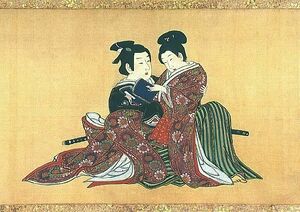Shudo
- Other Names: 男色 (nanshoku)
- Japanese: 衆道 (shudou, or shuudou), 若衆道 (wakashudou, or wakashuudou)
Shudô was a samurai custom in which adult samurai engaged in pederastic relationships with younger samurai. This custom is most prominently seen, or discussed, in the Sengoku and Edo periods.
The older man in the relationship, known as the nenja (念者), and the younger man, known by a variety of terms including wakashû (若衆), formed a close, tight personal relationship with one another. A nenja typically engaged in such relationships with only one wakashû at a time, and vice versa. Though much discussion today, based in modern/Western social mores about homosexual relationships, focus strongly on the homosexual sexual acts involved in the relationship, shudô relationships went beyond this, and were strong personal and sentimental or emotional relationships, which involved as well strong elements of mentorship. Mentorship and training in the "warrior" lifestyle and values of the samurai was a major element of the relationship.
References
- Maki Morinaga, "The Gender of Onnagata as the Imitating Imitated," positions 10:2 (2002), 245-284.
